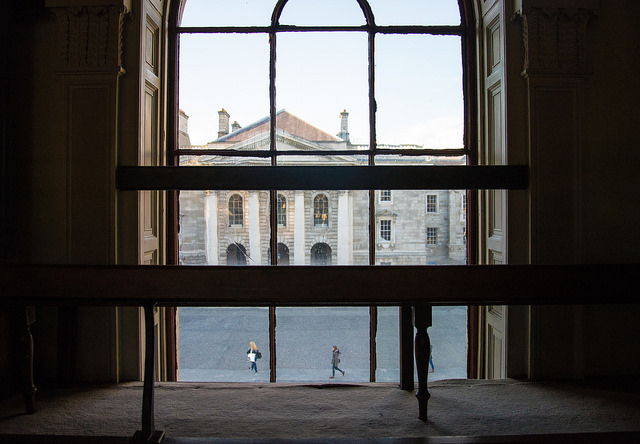Last May, homeless single mother Erica Fleming made national headlines when she was offered a place in Trinity, through the Trinity Access Programme (TAP). For Fleming, this was an opportunity to be an example to her daughter, Emily, that no adversity can hold you back. This was a moment of hope in a period of time where it is estimated that 4,262 people are in emergency accommodation, or sleeping rough in Dublin alone, as per Census 2016 figures.
However it has emerged this week that Fleming was denied Back to Education Allowance (BTEA), a weekly stipend available for those who which to return to education and, in the case of higher education, have been unemployed for at least nine months. Fleming, who lives in emergency hotel accommodation with her daughter, has been working part-time, which renders her unqualified. This denial has thus prevented her to be able to study in Trinity. This revelation has been met a mixture of outrage and confusion. An open letter posted by Trinity College Dublin Students’ Union (TCDSU) president, Kieran McNulty, addressed to current Minister for Social Justice, Leo Varadkar expressed this frustration, asking “are we really going to continue to deny people opportunities to access education, or punish them for working?”
One of the stipulations to qualify for BTEA is that one must be in receipt of certain qualifying social welfare payments. Last year, Fleming, like many lone-parents, was transferred from One-Parent Family Payment to the Family Income Supplement, in a move introduced by the government and criticised by then-TCDSU President Lynn Ruane.This is because the Family Income Supplement, unlike the One-Parent Family Payment, is not a qualifying social welfare payment for BTEA, therefore barring many from accessing the second-level and third-level education which would have helped them to enter the working world, and leave one of poverty behind.
At the time, this decision was condemned by many, including Fianna Fáil Party Leader, Micheál Martin, who referred to it an attack on “the most vulnerable, families in particular.” Some have called into question the logic of then-Minister for Social Justice, Joan Burton, as it seemingly further ensures that many must purely rely on the welfare state, rather than being able to venture out on their own. Unions and Fleming herself are arguing that the purpose of social welfare payments is meant to be to supplement those who are unable to provide for themselves, and to offer them a path to a self-sustaining life, and that stipulations like these only ensure further poverty, and a lack of prospects.
They argue that education is absolutely key to removing oneself from poverty, and that cost is an universal barrier to the access of education. Speaking on RTÉ Radio One, director of One Family, Karen Kieran, noted that whilst the government is seemingly aware that there is a priority to move parents off social welfare, and to get parents into education to benefit them and their families, “they haven’t put in the services or any kind of pathway for education”.
TAP, which has been in operation in the college for 17 years, was designed by Trinity to widen access and participation at third-level of under-represented groups. The course has proven very successful, with an Oxford college now offering a pilot scheme based on the model of TAP. However, the course is full-time, and runs for the nine months of the academic year.
Fleming has stated that, without the grant, starting in Trinity is not a possibility for now. She cannot continue to work, and also balance a full-time college course.
There is also the fact that the Family Income Supplement is only that – a supplementary payment, for those in low-pay work. Therefore, by entering education, Fleming would have these payments taken away, but is also not qualified for a SUSI grant. Fleming argues that she and others, have been abandoned by a system designed to help her, and others.
It’s for this reason that Fleming, the Union of Students in Ireland (USI) and TCDSU are calling call on Varadkar for immediate action, and to remove this loophole created by his predecessors. Speaking on the Ryan Tubridy show yesterday, Fleming spoke about how the government would “reap the benefits”, if she, and other lone-parents in similar situations to hers, were able to obtain degrees, and to obtain a better, more financially stable life for themselves.
She stated that she is asking that the Minister “see the logic” of providing a path to education for those who have been denied a more traditional route to learning. “That’s what I’m asking him,” she stated, “and I’m asking him to do it today.”







